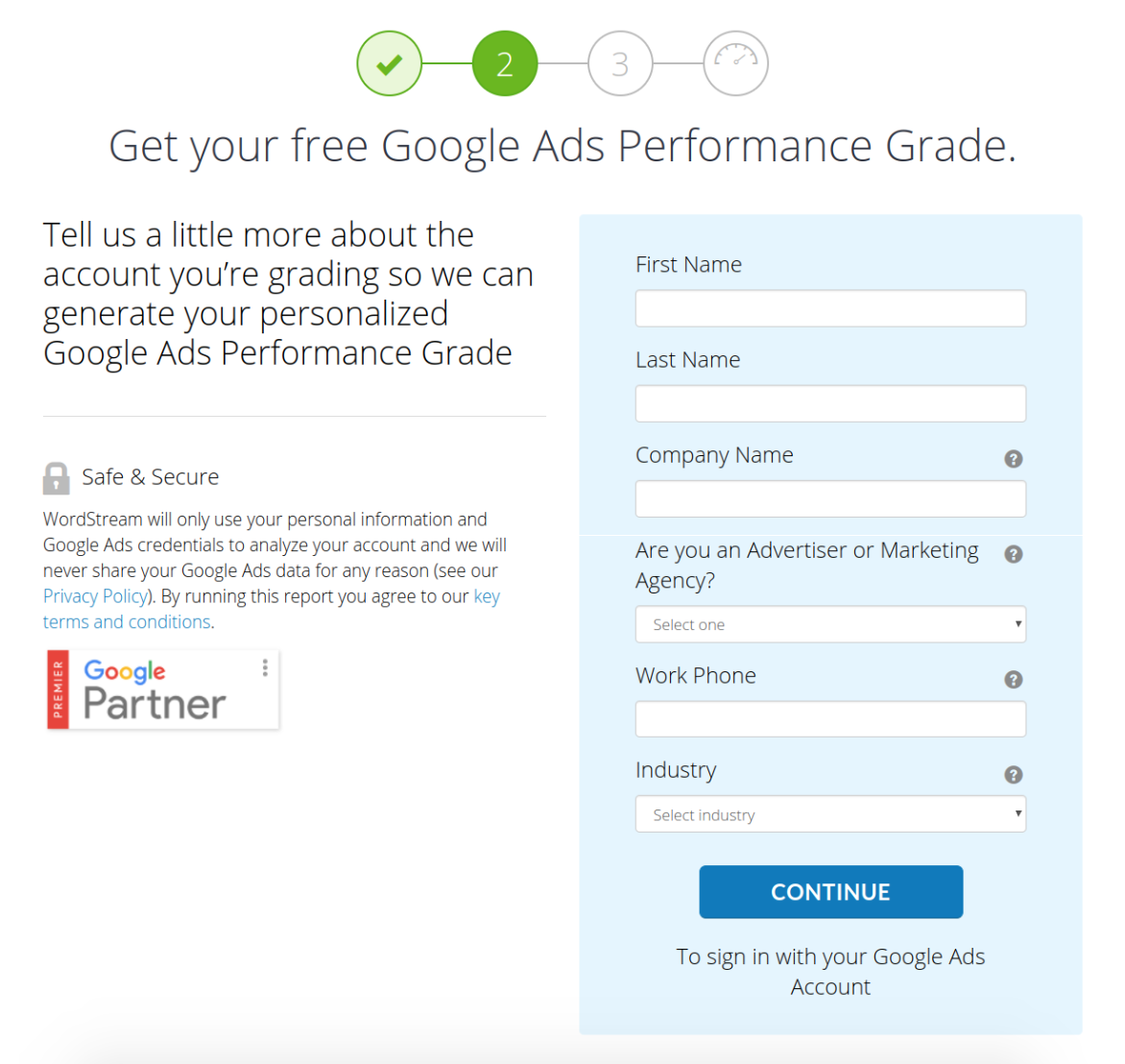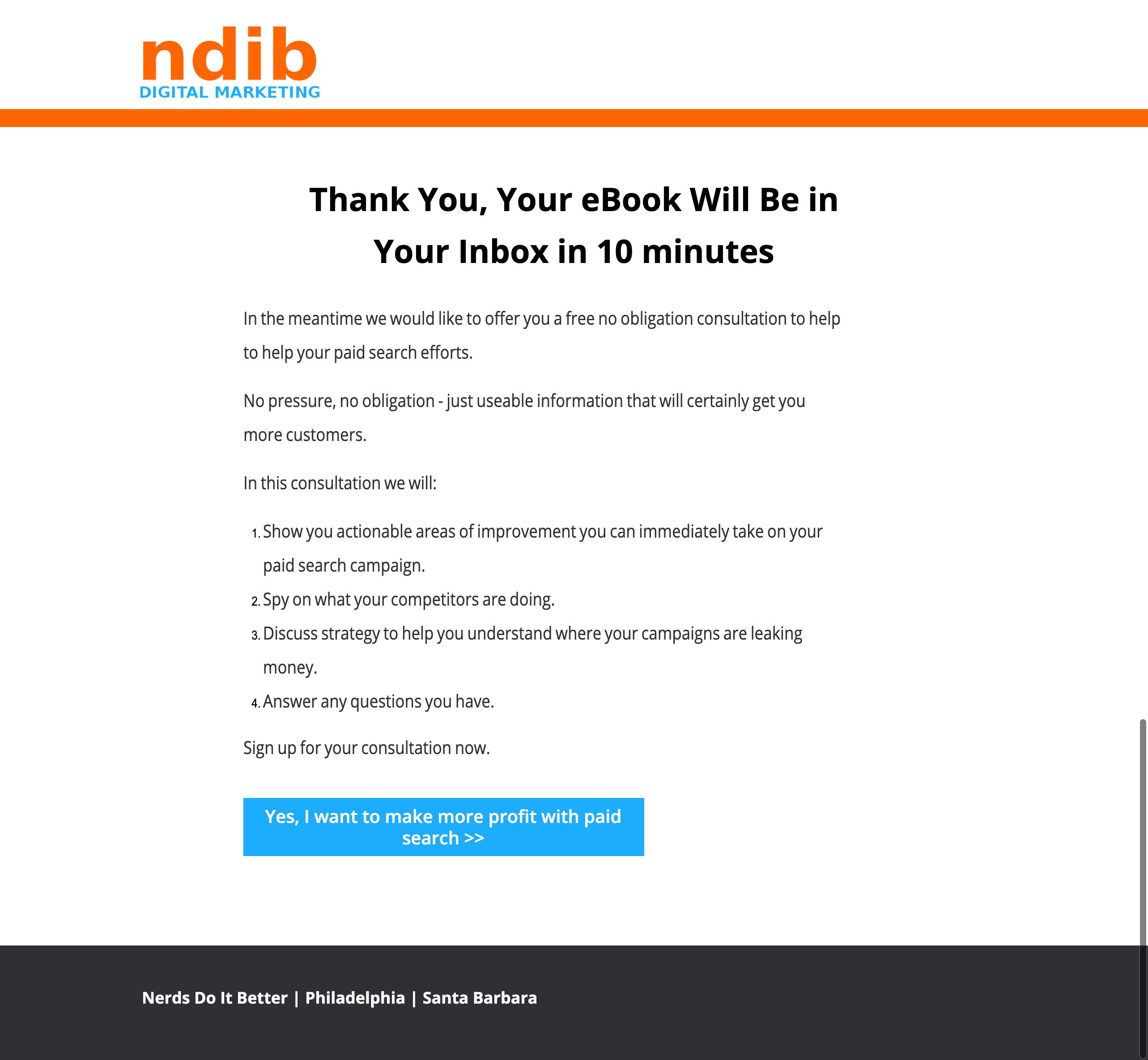12 Nov Why Your Thank You Page Is Costing You Money (& How to Fix It) via @adamlundquist
The experts tell you that a targeted user on Facebook clicks on your ad, downloads your lead magnet from the landing page, gets warmed up by your email sequence, and finally attends your core offer of a sales call and then you easily close the deal.
You figure the experts know what they are talking about – so you set up your funnel, launch your campaign and lean back in your chair figuring it is probably time to get fitted for a bathing suit so you can dive into your pool of money like Scrooge McDuck.
After a couple of days, you take a look at your ad metrics.
Great click-through rate, great CPA for ebook downloads – but no sales call bookings at all.
Users click your ad, download the lead magnet, and then just disappear into the abyss like Brendan Fraser’s acting career.
Your emails go unread and unopened.
This is frustrating. At best.
In an attempt to salvage the campaign, you decide to abandon the ebook funnel all together and just put the core offer of the sales call on the landing page.
Now users won’t even click the ad.
Your relevance score plummets, you pay more per click, and the email list you do have is full of prospects who either are uninterested in speaking with you or forgot your company altogether.
Your wasted money and time.
That pool of money you were thinking of diving into is just an empty hole.
The Problem: You Present the Core Offer at the Wrong Time
Your problem is that you present the core offer of a sales call at the wrong time in this funnel.
There are two basic scenarios in which this occurs:
You present your core offer as the lead magnet and users see it as a threat rather than an opportunity.
This crushes your click-through rate. A user scrolling on Facebook is unlikely to be so amped about hopping on a sales call that they will stop scrolling and book it.
This is especially true if they don’t know/like/trust your company yet (as a note, presenting a sales call as your lead magnet can work on Google Ads because it is a different medium).
You try to follow up via emails with your core offer but the user has forgotten about your business and you have lost all conversion momentum.
Your business might be the most important thing to you, but to the users, you are just another thing they clicked on. People have busy lives and sometimes as marketers, we forget that.
The Solution: Present Your Core Offer on the Thank You Page
If you’ve been thanking users and sending them on their way after they’ve downloaded your lead magnet, your “Thank You” page is costing you money. The only people who should be thanking you are Facebook’s shareholders.
Here is the simple solution: after a user downloads your lead magnet, present them with your core offer on the thank you page.
Users have already segmented themselves and expressed interest by downloading your lead magnet so you know it is an interested and invested audience.
Additionally, the thank you page is one of the few times you know that you have the users complete attention.
Why You Should Put Your Core Offer on the Thank You Page: Climbing the Yes Ladder
Putting the core offer on the thank you page leverages a know persuasion technique is called the “yes ladder.”
In a yes ladder, a person is asked to comply with a series of requests, starting small which gets larger upon each request.
With each request the user complies with, they are more likely to comply with the next compliance request.
As this applies to the funnel, the first compliance request of providing their email in exchange for the lead magnet is small, and because they have already complied with this request it’s much more likely for them to comply with the next, larger request (the sales call or core offer).
This leads to conversion momentum which pushes them over the “tipping point” and gets them to book your core offer of a sales call.
How to Build an Effective ‘Thank You’ Yes Ladder
Let’s walk through how to implement micro-commitments and a “yes ladder” on your “Thank You” page to increase users’ interest in your core offer.
1. Choose Your Core Offer & First Impression Incentive
We are going to start by working backward because, in terms of business, I have found working backward from what you want to be most profitable.
Start with your goal in mind.
Identify the goal for your core offer. It could be anything from wanting users to schedule a consultation, purchase a product, or sign up for a free trial.
Next, think about the first impression incentive.
What can you provide a prospect or user that will immediately improve their situation?
2. Strategically Add Questions to Create Your Yes Ladder
Now that you’ve decided what you want to accomplish, it’s time to set up a series of questions for the user to agree to.
Start with simple questions and work your way up to your core offer.
The more users comply with your first set of questions, the more likely it becomes for them to agree to your final offer.
Here is an example from WordStream:


They ask their prospects to answer basic questions, such as their name, industry, and if they are an advertising or marketing agency.
These are all low-bar, non-threatening questions that push users up the “Yes Ladder” and provide the low threat offer of a Google Ads performance grade.
You can also see that in the navigation that WordStream lets the user know exactly what step they are on and that it is, in fact, a multi-step funnel.
3. Hit Them with Your Core Offer
After your prospects have answered questions and converted on your smaller offer (with the smaller threat of just asking for the email), it is time to present them with your CTA of your core offer and lead them to the next step of the buyer’s journey.
As an example, after a user downloads one of my company’s ebooks, we then present the user with the opportunity to convert on our core offer to get a free consultation.
We know that since the user has completed the smaller conversion step that they have engaged the principles of commitment and consistency they are much more likely to opt into our consultation.


WordStream does the same thing where prospects are rewarded with a personalized Google Ads Performance Grade and presented with WordStream’s core offer of a free trial on the thank you page.
That’s how you create a successful “Yes ladder” and build a “Thank You” page that nurtures and converts leads to your core offer.
What is the one thing still stopping you from making money with your “Thank You” page?
More Resources:
- 8 Dos & Don’ts for Your PPC Landing Page
- What Is a Lead Magnet & 10 Examples You Can Use Now
- 5 Examples of Value Propositions & Why They Are So Great
Image Credits
All screenshots taken by author, September 2019
Sorry, the comment form is closed at this time.